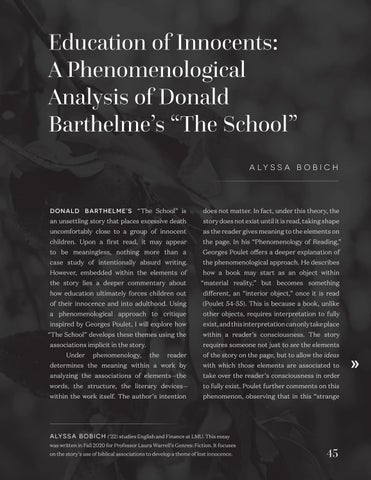Education of Innocents: A Phenomenological Analysis of Donald Barthelme’s “The School” A LY S S A B O B I C H
D ONALD BARTHELME’S “ The School” is
does not matter. In fact, under this theory, the
an unsettling story that places excessive death
story does not exist until it is read, taking shape
uncomfortably close to a group of innocent
as the reader gives meaning to the elements on
children. Upon a first read, it may appear
the page. In his “Phenomenology of Reading,”
to be meaningless, nothing more than a
Georges Poulet offers a deeper explanation of
case study of intentionally absurd writing.
the phenomenological approach. He describes
However, embedded within the elements of
how a book may start as an object within
the story lies a deeper commentary about
“material reality,” but becomes something
how education ultimately forces children out
different, an “interior object,” once it is read
of their innocence and into adulthood. Using
(Poulet 54-55). This is because a book, unlike
a phenomenological approach to critique
other objects, requires interpretation to fully
inspired by Georges Poulet, I will explore how
exist, and this interpretation can only take place
“The School” develops these themes using the
within a reader’s consciousness. The story
associations implicit in the story. Under
phenomenology,
requires someone not just to see the elements the
reader
of the story on the page, but to allow the ideas
determines the meaning within a work by
with which those elements are associated to
analyzing the associations of elements—the
take over the reader’s consciousness in order
words, the structure, the literary devices—
to fully exist. Poulet further comments on this
within the work itself. The author’s intention
phenomenon, observing that in this “strange
A LY S S A B O B I C H (‘22) studies English and Finance at LMU. This essay was written in Fall 2020 for Professor Laura Warrell’s Genres: Fiction. It focuses on the story’s use of biblical associations to develop a theme of lost innocence.
45
»











